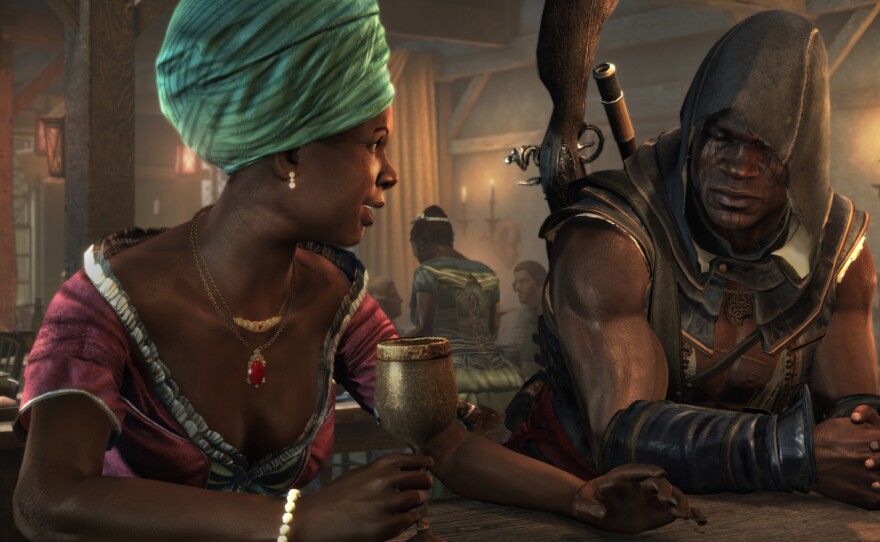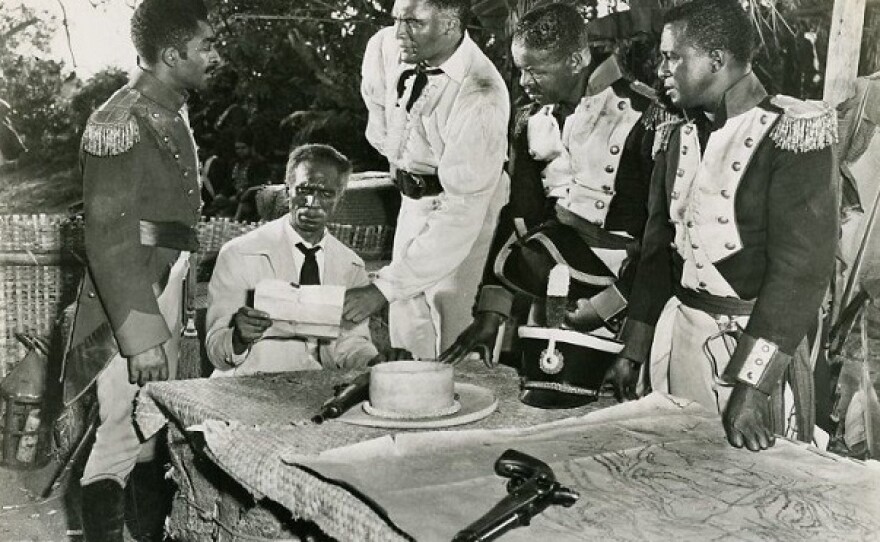Companion viewing
"The Emperor Jones" (1933)
"Lydia Bailey" (1952)
"Toussaint Louverture" (2012 miniseries)
Historical background
The Haitian Revolution that started in the late 1700s was noteworthy for being the first uprising of enslaved Africans in the New World to succeed in creating an independent state. So explains Cal State University San Marcos history professor Alyssa Goldstein Sepinwall in her new book "Slave Revolt on Screen: The Haitian Revolution in Film and Video Games."
"The Haitian Revolution was one of the most important events in modern world history but it's often one of the least discussed or understood," Sepinwall said in a Zoom interview. "Haiti had been a French colony called Saint-Domingue in the 17th and 18th century. It was the richest colony in the Americas. That wealth came from growing sugar and coffee, which the Europeans made enslaved Africans do in a really brutal and backbreaking system of labor. But after the French Revolution started in 1789 and French whites were fighting among themselves. Enslaved people in Haiti realized that this was a time when they could finally get their freedom. So the Haitian revolution broke out in 1791 and three years later, they had forced the end of slavery."
It was an incredible David versus Goliath narrative with the enslaved Haitians fighting against Napoleon's armies and winning. Yet it is a chapter in history that is not often told in films or other media, and there's a reason.
"The event scared a lot of whites around the Atlantic world and the United States," Sepinwall said. "There was slavery at that time, of course. So there was an effort to try to blot out Haiti or to punish it so that enslaved people in other countries wouldn't get the idea to try the same thing. There's really been this effort to kind of have amnesia or not talk about it exactly for that reason, because it frightened the enslavers."
And the idea of Blacks killing whites on screen frightened Hollywood. So mainstream films about the Haitian Revolution are almost non-existent.
Haitian Revolution on film
But there is one odd exception, 20th Century Fox's "Lydia Bailey" from 1952 about two white Americans falling in love in the middle of the Haitian Revolution. It was based on a popular historical romance that no one at the studio had read.
"I was also able to get access to the archives before COVID at USC and in Boston and at the Oscars Library to see the debates that were happening as they made this film, which was kind of an accidental Haitian Revolution film. Fox bought the rights to one of the biggest historical novels of 1947 and when they they had not seen the plot at all, When they read the script and they thought about it, they realized that this needed to be set in Haiti, which raised a lot of issues that they were maybe and maybe not ready to be dealing with at that time. It was also part of this wave of social message films about race in that era that Fox and other studios made, including 'Gentlemen's Agreement' (about anti-Semitism in America)."
But the film is not available on any home media format so it has largely been forgotten. There have been some other non-Haitian films and TV shows about the revolution but many are marred by tropes about slavery and colonialism or by an unwillingness to either depict the brutality of the slave owners or the ability of the slave to engineer their own rebellion.
But despite these flaws in the few films that exist, Sepinwall said pop culture has an amazing ability to bring history to life.
"I love reading, but texts are flat and they're two dimensional," Sepinwall stated. "So I think the lived experience of seeing something on screen and being immersed in it, of getting to know characters and imagining how they lived often makes history more real for people. But traditionally the attitude of historians was to look down on historical films because they would just go through them and say, 'wrong, wrong, wrong, made up imagined.' But the pioneering film historian Robert Rosenstone, who is a professor at Caltech, offered a new way of thinking about film. He said, 'Look, if we're going to talk about a film that's an hour and a half or two hours, that has to compress a lot of things into it, it cannot get everything exactly right or it's going to be boring and put people to sleep.' So film is a different medium from text. And what we need to do as historians is come up with a different way of thinking about historical film instead of saying is every detail exactly right. We should say instead, does this film bring to life or make vivid something about the past that we might have missed if we were just looking at texts?"
So some factual inaccuracy is acceptable so long as a film doesn't distort the larger truth of what was happening at the time.
Haitian filmmakers have looked to the revolution in short films, features and documentaries but without the budgets or distribution reach of Hollywood and European companies.
Sepinwall also pointed to Chris Rock as one source of inspiration for the book. She cited his hosting of the Oscars where his jokes took jabs at the white Hollywood establishment as well as a film he made called "Top Five" (in which a comedian decides to make a serious film about the Haitian Revolution) as things that used humor to point out systemic racism. So she is offering a serious analysis to complement the comedic treatment that he has offered of these issues.

Video games and history
Sepinwall's book also looks to video games and specifically Ubisoft's "Assassin's Creed: Freedom's Cry" for a different look at the Haitian Revolution.
"I'll say first that historians for the most part have completely ignored video games, many of us don't play them," Sepinwall said. "And then there was this assumption that if a film makes mistakes, that video games are even more trivializing. But, of course, the general public, especially the younger generation who love historical video games, they learn more about the past from these games often than they might in school. And historical video gaming for people who don't know is a billion dollar industry. I was surprised myself when I first learned that there was a game that looked at resistance by enslaved Africans in Haiti in the 18th century."
Sepinwall discovered the game through a student.
"One of the things I realized when I watched the trailer for this game, 'Assassin's Creed: Freedom's Cry, was that all of the problems with foreign non Haitian films on the Haitian revolution were not in this game," she explained. "This game led audiences to empathize with enslaved people. It did not whitewash the French slavery system. It led players to empathize with enslaved people trying to free themselves. So I thought that that was pretty incredible."
Since Sepinwall's book addresses how many of the films present stories of slave rebellion through the touchstone of a white narrator or hero, I asked what kind of a response she has gotten being a white American writing the book.
"I will say that I actually get more appreciation for this work from Haitians who really appreciate that I'm looking at the story and that I'm emphasizing Haitian cinema," Sepinwall said. "But it's also been nice to see the reaction from the filmmakers to my book and that people appreciate that some of their films which have not been written about before, that I wrote about them very sensitively and thoughtfully."
Sepinwall's book is available online through Amazon and Barnes and Noble. Signed copies can be purchased at Diesel Bookstore in Del Mar.
If you are interested in Haitian film then check out the Haiti International Film Festival that starts Aug. 13.








